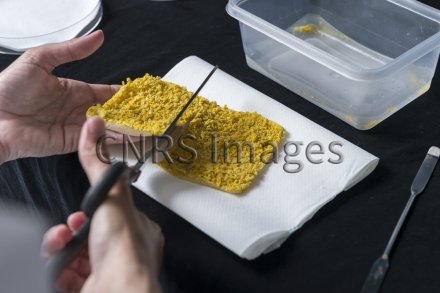Production year
2017

© Cyril FRESILLON/CRCA /CNRS Images
20170048_0150
Cutting up the social amoeba Physarum polycephalum, commonly referred to as the "blob". The many characteristics of this primitive, unicellular organism include the ability to heal itself in less than two minutes and reorganise its entire venous system in three hours. It can also be cloned if it is cut into 1-mm pieces. Sensitive to light, it grows in damp environments and feeds on bacteria and fungi. It can double in size each day. Although it has no brain, it is capable of learning from its experiences and passing on the information learned to other individuals by fusing with them, demonstrating that learning is not necessarily dependent on the nervous system. Lastly, it has a venous system that forms according to the same physical laws that govern the vascularisation of cancerous tumours, which means it could be used as a model.
The use of media visible on the CNRS Images Platform can be granted on request. Any reproduction or representation is forbidden without prior authorization from CNRS Images (except for resources under Creative Commons license).
No modification of an image may be made without the prior consent of CNRS Images.
No use of an image for advertising purposes or distribution to a third party may be made without the prior agreement of CNRS Images.
For more information, please consult our general conditions
2017
Our work is guided by the way scientists question the world around them and we translate their research into images to help people to understand the world better and to awaken their curiosity and wonderment.